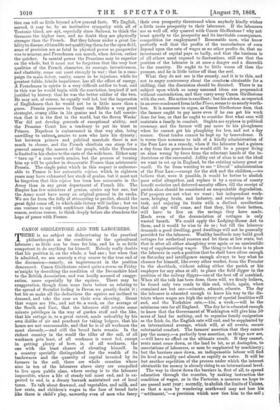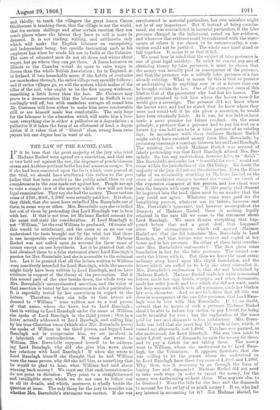CANON GIRDLESTONE AND THE LABOURERS.
THERE is no subject so disheartening to the practical philanthropist as the condition of the agricultural labourer ; so little can be done for him, and he is so little competent to do anything for himself. Nobody really doubts that his position is, on the whole, a bad one ; but when that is admitted, we are scarcely a step nearer to the true end of the discussion—namely, an improvement in the position denounced. Canon Girdlestone raised quite a storm on Friday se'nnight by describing the condition of the Devonshire hind to the British Association, and was loudly accused of exagge- ration, more especially by the squires. There may be exaggeration, though from some facts before us relating to the spread of Socialist feeling in Devon we greatly doubt it ; but let us make all the deductions the squires are inclined to demand, and take the case on their own showing. Grant that wages are 10s., and not 8s. a week, on the average of the South and East, that the labourer still retains some minute privileges in the way of garden stuff and the like, that his cottage is, to a great extent, made unhealthy by his own dislike of air and penchant for taking lodgers, that his hours are not unreasonable, and that he is of all workmen the most slovenly,—and still the broad facts remain. In the richest country in the world the tiller of the soil, of all workmen gets least, of all workmen is worst fed, except in getting plenty of beer, is, of all workmen, the one with the least chance of elevating himself. In a country specially distinguished for the wealth of its landowners and the quantity of capital invested by its farmers in the soil, there are whole counties where nine in ten of the labourers above sixty are compelled to live upon public alms, where saving is to the labourer impossible, where a life of steady toil must end, and is ex- pected to end, in a dreary barrack maintained out of local taxes. To talk about firewood, and vegetables, and milk, and low rents, and children's wages in the face of broad facts like those is child's play, unworthy even of men who fancy 1 their own prosperity threatened when anybody kindly wishes a little more prosperity to their labourers. If the labourers are so well off, why quarrel with Canon Girdlestone ? why not- trust quietly to the prosperity and its inevitable consequence. competition for employment? Reasonable men, who know- perfectly well that the profits of the manufacture of corn depend upon the rate of wages as no other profits do, that no investment of capital pays so badly, and that the business is of all others most exposed to fluctuations, still see that the- position of the labourer is at once a danger and a discredit to the country. He ought to be little worse off than the- yeoman, and he is little better off than the serf.
What they do not see is the remedy, and it is to this, and not to angry controversy about the comforts obtainable for a. shilling, that the discussion should be directed. There is no subject upon which so many unsound ideas are propounded. without contradiction, and they carry away Canon Girdlestone- with the rest. His action is excellent; but his advice, as reported. in an over-condensed form in the Times, seems to us nearly worth- less. It is nonsense to argue, as Canon Girdlestone does, that. the farmer ought to pay more even if he can get his work done for less, or that he ought to consider first what sum will maintain a family in comfort. Oughts are cyphers in political economy, and the farmer will pay more to his ploughmen- when he cannot get his ploughing for less, and not a day sooner. Great trades cannot be kept up by benevolence. It is worse than nonsense to talk of a kindly administration or the Poor Law as a remedy, when if the labourer had a guinea- s day from the poor-house he would still be a pauper living- on alms wrung by force from the reluctant hands of the in- dustrious or the successful. Jollity out of alms is not the ideal we want to set up in England, be the existing misery great or small. So far from wanting to see " liberal " administration of the Poor Law,—except for the sick and the children,—we- believe that, were it possible, it would be better to abolish poor relief altogether, and replace it by a system of county benefit societies and deferred-annuity offices, till the receipt of parish alms should be considered an unspeakable degradation. Fat paupers are not what we want ; but independent work- men, bringing brain, and industry, and enterprise to their- task, and enjoying its fruits with a distinct recollection that old age will come, and that they, like their betters,. will have to live on the savings they have made. Mucheven of the denunciation of cottages is only wasted breath. We could apply the Lodging-House Act to, them, and it would be wise to do so ; but till the labourer demands a good dwelling, good dwellings will not be generally provided for the labourer. Wealthy landlords may build good. cottages for Eesthetical reasons and let them at low rents, but that is after all either almsgiving over again or an unscientific way of supplementing wages. The thing to be done is to place- the labourer in such a position that he shall have silver enough, on Saturday and intelligence enough always to buy what he chooses for himself, like every other worker, from the Premier- to the shoeblack, without asking either the parish or his- employer for any alms at all; to place the field digger in the- position of the railway digger—one of the best off of mankind._ When all the talk has been done, there will, we firmly believe„. be found only two roads to this end, which, again, when examined are but one—educate, educate, educate. The day the labourer is educated enough to know his way to the dis- tricts where wages are high the misery of special localities will end, and the Yorkshire rate,-15s. a week,—will be the- minimum rate for all England. The day he is educated enough to know that the Government of Washington will give him 50,' acres of land for nothing, and to organize family emigration as the Irish do, the English rate will end, and be supplanted by an international average, which will, at all events, secure- substantial comfort. The farmers' assertion that they cannot ' pay the money,—a perfectly true assertion, as things now are, —will have no effect on the ultimate result. If they cannot,. rents must come down, or the land be let, as at Assingdon, to associations of labourers, or men be supplanted by machinery;. but the barriers once down, an indispensable labour will find its level as readily and almost as rapidly as water. It will be' but another repetition of the process under which the interest obtainable for money is already rising to an international level..
The way to throw down the barriers is, first of all, to spread education through the counties, by making instruction the- condition of wages, as in the Factories, a measure we hope to.
see passed next year ; secondly, to abolish the limits of Unions, so that a man by wandering northward may not lose his- " settlement,"—a provision which now ties him to the soil ;." and, thirdly, to teach the villagers the great lesson Canon Girdlestone is teaching them, that the village is not the world, that for certain shillings and after certain exertion they can reach places where the labour they have to sell is more in demand. It is not reading, writing, and arithmetic only which will make the English labourer an enterprising and independent being, but specific instruction such as his employer has when he sends his son to India or the Colonies. The sons of educated men do not sit down and whine about wages, but go where they can get them. A dozen lecturers on Illinois or the Canadas would do more to raise wages in Devon than the whole British Association ; for in England, as in Ireland, if two households move, if the habits of centuries are oncebroken through, the entire village very speedily follows ; and if entire villages go, so will the system which makes of the tiller of the soil, who ought to be the first among workmen, something a little lower than the last. Mr. Corrance may prove to a demonstration that the labourer in Suffolk is ex- ceedingly well off, but with smokeless cottages all round him Mr. Corrance will have either to make him more comfortable still, or see himself made less comfortable. The only hope for the labourer is the education which will make him a free- man, everything else is either a palliative or a degradation ; a palliative if it takes the form of an allotment of land, a degra- dation if it takes that of " liberal " alms, wrung from rate- payers but one degree less in want of aid.































 Previous page
Previous page